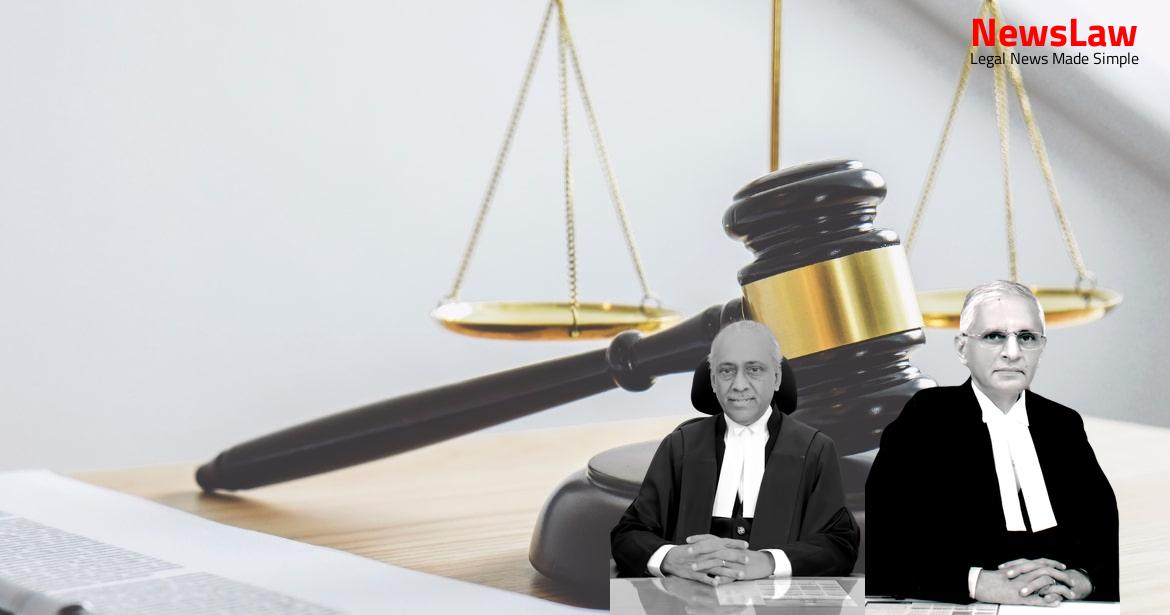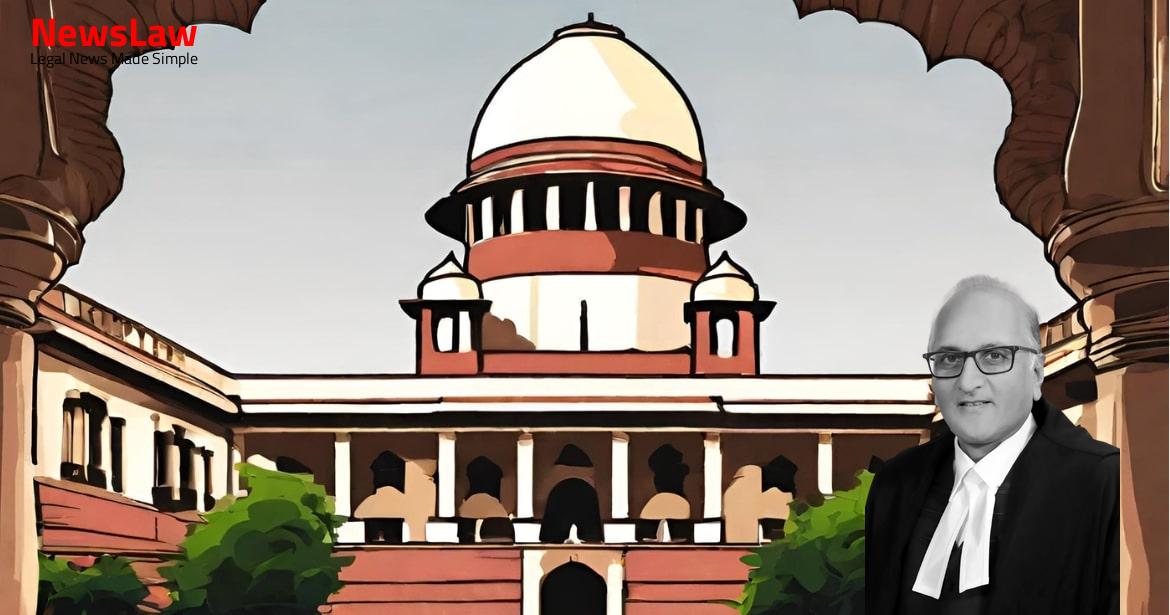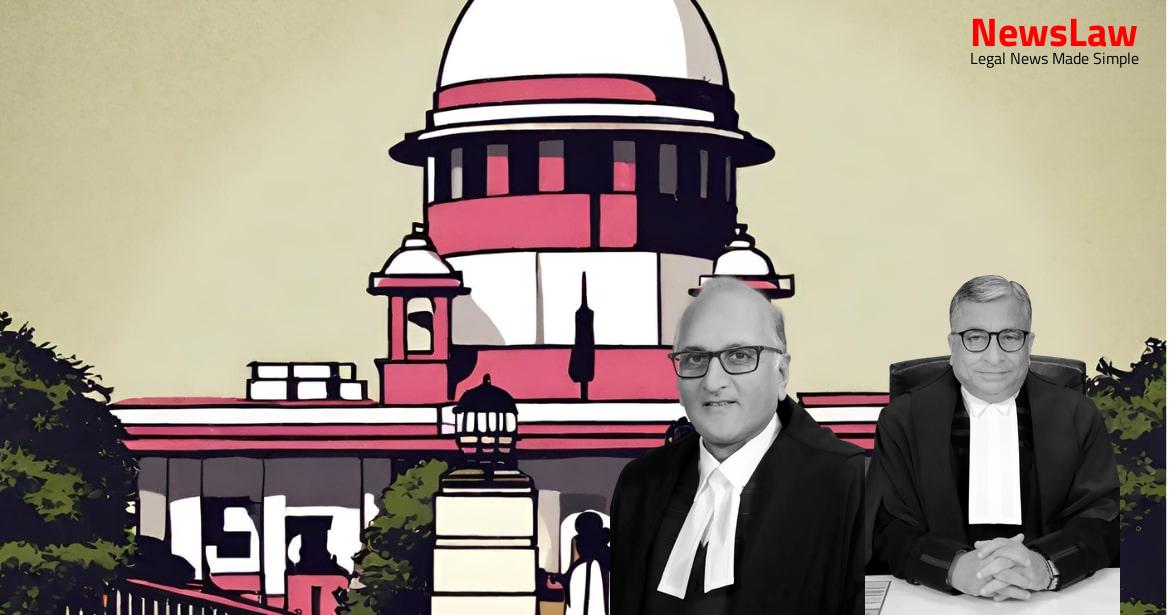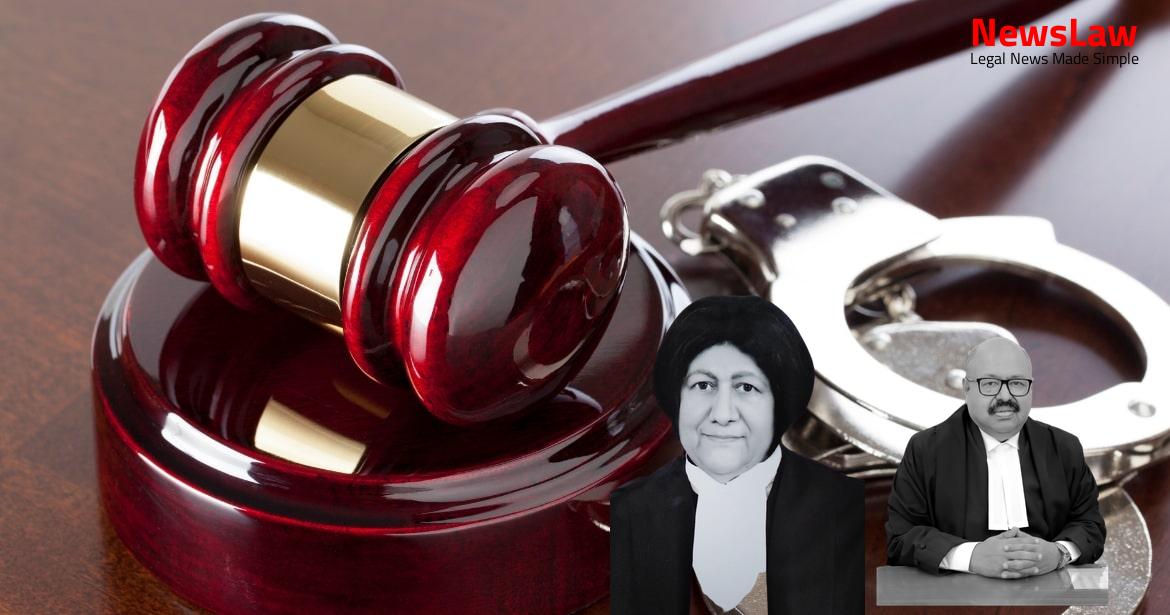Delve into the fascinating world of legal interpretation as courts dissect the term ‘date’ in the context of disqualification cases. The nuanced analysis of time and events in legal proceedings plays a pivotal role in shaping outcomes. Stay tuned to uncover the complexities of legal interpretation and its implications on the rule of law.
Facts
- Shri Amit Kumar Mahto was an elected member of the Assembly belonging to Jharkhand Mukti Morcha Party (JMM) who cast his vote in favor of Shri Dhiraj Prasad Sahu, the Congress candidate
- Despite the conviction and sentence of two years imposed on Shri Amit Kumar Mahto on the same day as the election, the Returning Officer declared the results without invalidating his vote
- The High Court found that Shri Amit Kumar Mahto did not cast his vote as evidenced by PW-1 and Exhibit-9
- The High Court concluded that the election petitioner could not be granted relief due to the complexity and technicality of the proportional representation system of single transferable vote used in the Council of States election
- Amit Kumar Mahto’s disqualification due to his conviction was found to be significant in view of the margin of victory in the election
- The Returning Officer, Mr. Binay Kumar Singh, was examined as PW-1 and the original ballot paper by which Shri Amit Kumar Mahto cast his vote was marked as Exhibit-9.
- One of the returned candidates, Shri Dhiraj Prasad Sahu, filed an appeal (Civil Appeal No.2159 of 2020) aggrieved by the findings on several issues.
- The defeated candidate, Pradeep Kumar Sonthalia, filed an election petition (Election Petition No.01/2018) alleging improper reception of a void vote by Shri Amit Kumar Mahto.
- Prayers in the election petition included a declaration of improper vote reception and setting aside the election of Shri Dheeraj Prasad Sahu with a consequential declaration of the petitioner’s election.
- The High Court framed 6 issues for consideration in the Election Petition, including the casting of Shri Amit Kumar Mahto’s vote and the validity of votes cast.
- Out of the 80 votes cast, two were declared invalid by the Returning Officer, raising questions about the election’s legitimacy.
Also Read: Electoral Malpractices in Mayor Election
Issue
- Notification issued for biennial elections for two seats in the Council of States from Jharkhand on 05.03.2018.
- Three candidates filed nominations on 12.03.2018 – Pradeep Kumar Sonthalia, Samir Uraon, and Dhiraj Prasad Sahu.
- Election held on 23.03.2018 at the Vidhan Sabha.
- Query on the validity of a vote cast by a Member of the Legislative Assembly in a Rajya Sabha election in the forenoon, becoming invalid due to his disqualification from a criminal court conviction in the afternoon of the same day.
- No dispute that Shri Amit Kumar Mahto cast his vote at 9:15 A.M. before conviction judgment at 2:30 P.M.
- Two issues remaining: 1. Validity of the vote cast by Shri Amit Kumar Mahto. 2. Legality of the Returning Officer’s rejection of objection due to not having received the conviction judgment before result declaration.
Also Read: Balancing Power and Transparency: Electoral Bonds Struck Down, Disclosure Mandated
Arguments
- The appellant argued that whenever a statute mentions a ‘date’ in relation to an event, it is interpreted to occur at the start of the day at 00.01 a.m.
- They contended that despite the Sessions Court announcing the judgment of conviction and sentence at 2.30 P.M. on 23.03.2018, legally the date of conviction began at 00.01 A.M. when the date changed from March 22 to March 23.
- Reference was made to the case of Prabhu Dayal Sesma vs State of Rajasthan, where the interpretation of the legal date commencing after midnight was discussed in the context of age computation for recruitment to the Rajasthan Administrative Service.
- Prabhu Dayal Sesma case related to the application of Rule 11B of the Rajasthan State and Subordinate Services Rules 1962, which set age limits for direct recruitment to the service.
- The case involved a candidate who was born on 02.01.1956 and was considered to have crossed the upper age limit of 28 years on 01.01.1984 as per the rule, resulting in rejection of the candidature.
- Section 4 of the Indian Majority Act 1875 was referenced in the Prabhu Dayal Sesma case to determine the age computation method for individuals.
- The time at which the judgment was delivered is deemed irrelevant, focusing instead on the date of conviction.
- Disqualification is seen to commence at 00.01 A.M. on 23.03.2018.
- Citing the B.R Kapur vs State of T.N. & Anr. decision, it is argued that Article 191 of the Constitution and Section 8 of the R.P. Act are not penal provisions, and hence beneficial construction does not apply.
- The primary objective of such disqualification is the purification of politics.
Also Read: Recall of Resolution Plan Approval: Legal Analysis
Analysis
- The principle that a person ceases to be a member automatically upon disqualification, independent of Article 193.
- In Australia, this principle is considered an aspect of the rule of law known to Parliament and the Courts.
- The word ‘date’ can mean the point in time when an event occurred rather than the whole day.
- Fresh policy taken on 28.09.1984 influenced the interpretation of Section 36(2) of the Act.
- Disqualification under Article 193 carries civil consequences and denial of privileges besides the penalty.
- The interpretation of the word ‘date’ varies depending on context, whether for imprisonment period calculation or limitation period for appeal.
- Court rejected the appellant’s argument in the case of Pashupati Nath Singh regarding the timing of taking oath before the Returning Officer.
- The date of conviction sets the start of disqualification, and the completion of a six-year period after release marks the end of disqualification.
- Disqualification based on conviction for offences falls under Section 8(3) of the Act.
- The interpretation of ‘date’ in Section 8(3) should align with the penal provisions of the conviction.
- The principle of innocence until proven guilty remains fundamental and should guide interpretations of penal provisions.
- Disqualification aims to prevent criminalisation of politics, emphasizing the importance of the interpretation of disqualification laws.
- The running of time pauses upon nomination in Pashupati Nath Singh case to prevent confusion.
- The de facto doctrine holds acts performed in the public interest by assumed officials as valid and binding.
- The interpretation of ‘date’ in disqualification laws also affects the timing of other disqualifying events.
- Disqualification causes a seat to become vacant according to Article 190(3) once the period starts running.
- The rule of legality dictates that actions conform to statutory provisions.
- Interpreting ‘date’ as the beginning of an event is crucial in legal contexts to ensure clarity and adherence to rules.
- The statutory scheme should steer clear of positing consequences before causes to maintain legal logic.
- The acts of the disqualified individual may be invalidated in certain circumstances, considering the penalty under Article 193.
- The acts of officials within their assumed authority are generally considered valid under the de facto doctrine.
- The disqualification under Section 8(3) of the Act is a consequence of the conviction, emphasizing the cause-effect relationship.
- Interpretations of Section 8(3) should align with the Constitutional scheme and ensure the presumption of innocence until proven guilty.
- Section 8(3) addresses both the conditions and the period of disqualification, requiring interpretations to be in line with the Constitutional provisions.
- The event causing disqualification under Article 191(1)(e) is a conviction for specified offences.
- Consequence of disqualification is the vacation of the seat and deletion of the member’s name from the list.
- A member’s seat becomes vacant upon disqualification or resignation.
- The Representation of the People Act, 1951 deals with disqualifications on conviction for certain offences.
- A disqualified member cannot vote in elections and ceases to be an elector.
- The disqualification results in removal from the voter list.
- Sitting or voting as a member before compliance with requirements leads to a penalty.
- The Speaker or Chairman cannot accept resignations that are not voluntary or genuine.
- Article 191 covers both contesting elections and continuation in office after getting elected.
- The Motor Accident Claims Tribunal upheld the repudiation of liability by the insurer, but the High Court held that the policy of insurance obtained on the date of the accident became operative from the commencement of the date of insurance.
- The court referred to the decision in Re F.B. Warren, which stated that a judicial act will be referred to the first moment of the day on which it is done.
- In a subsequent decision in National Insurance Company Limited vs. Jijubhai Nathuji Dabhi & Ors., it was explained that specific time mentioned in the policy of insurance would prevail over general provisions.
- A policy of insurance is considered a contract and must abide by the terms specified within it.
- Election disputes are governed by statutory rights and are not considered fundamental rights or common law rights.
- Concepts familiar to common law and equity should not be imported into election law unless specifically provided for by statute.
- Cases under insurance law do not have relevance to cases of disqualification in elections.
- Different principles of interpretation are applied in cases of insurance law, election law, or other legal matters based on specific statutes.
- The interpretation of terms in a contract, such as “the date” in an insurance policy, largely depends on the intent of the parties involved.
- The court cited various cases to support the interpretation of terms like “the date” in different legal contexts.
- The de facto doctrine was invoked in various situations to validate acts performed by individuals even if their appointment or status might have been later deemed invalid.
- Interpreting the Returning Officer’s actions based on foresight is unreasonable.
- It would be chaotic to vest the Election Commission with the power to predict future events.
- The second issue does not need to be considered in this case.
- The appellant’s interpretation does not align with Article 191.
Decision
- Civil Appeal No.611 of 2020 is dismissed.
- Civil Appeal No.2159 of 2020 is allowed.
- The findings of the High Court on issue Nos. 2, 3 and 5 framed by the High Court are set aside.
Case Title: PRADEEP KUMAR SONTHALIA Vs. DHIRAJ PRASAD SAHU @ DHIRAJ SAHU (2020 INSC 710)
Case Number: C.A. No.-000611 / 2020



